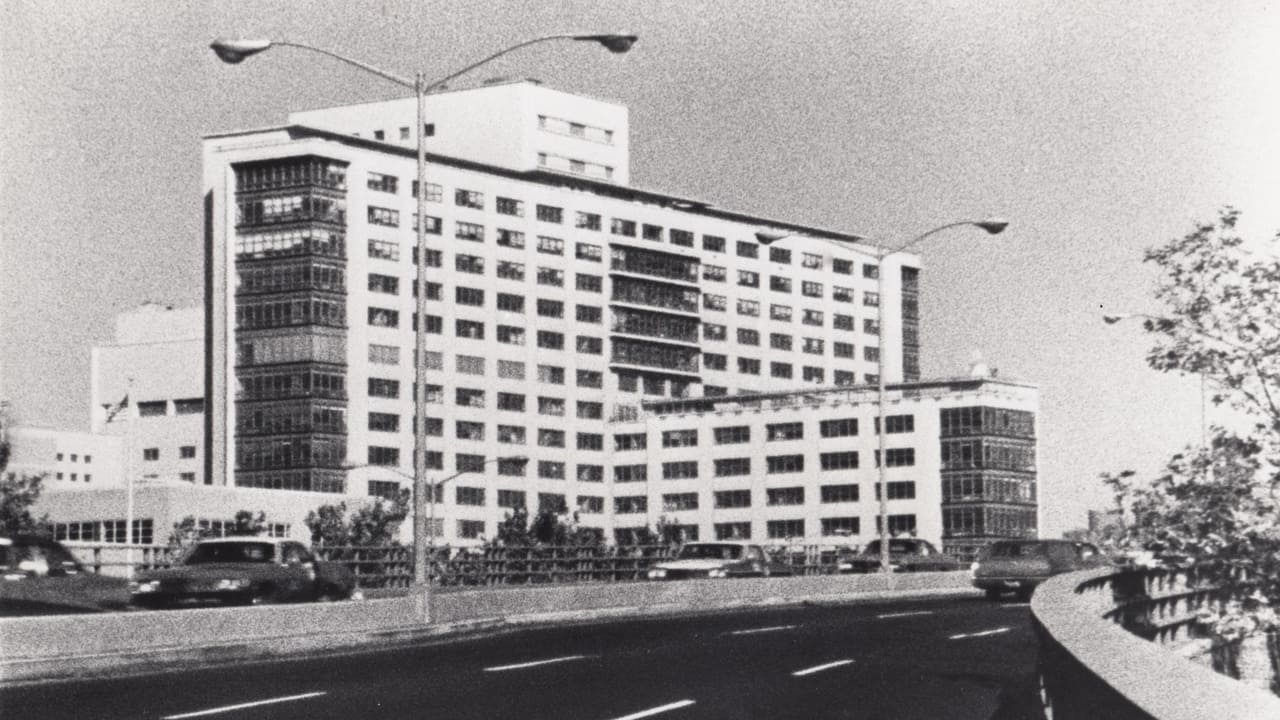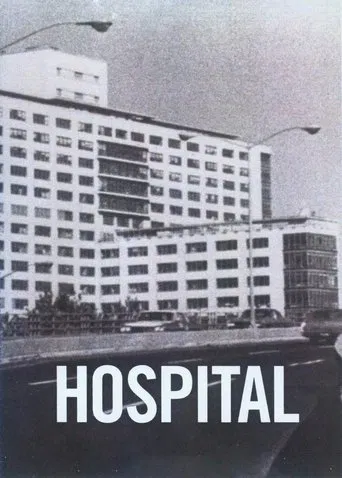

SERIOUSLY. This is what the crap Hollywood still puts out?
... View MoreIt's easily one of the freshest, sharpest and most enjoyable films of this year.
... View MoreIt is interesting even when nothing much happens, which is for most of its 3-hour running time. Read full review
... View MoreA film of deceptively outspoken contemporary relevance, this is cinema at its most alert, alarming and alive.
... View MoreMore horror film than documentary, Frederick Wiseman's "Hospital" begins with a patient's stomach being cut open by doctors. Wiseman's camera then peers inside the bloody gap, a moment which perhaps signals Wiseman's intentions with "Hospital": to peer into a sphere of human life which man routinely keeps sanitised and concealed.The most exploitative of Wiseman's films, "Hospital" takes place within a bustling American hospital. Patients come and go, doctors dart back and forth, and bodily fluids and bleach fight a perpetual war. One patient starts to cry when a doctor asks to examine his penis, another recounts the death of a loved one, and many other men, women and children are watched as they expose an emotional and physical nakedness which films seldom reveal. On the level of ethics, Wiseman shouldn't be showing this – some patients seem tricked into allowing themselves to be filmed – but on the level of art, the film offers something raw and important. For Wiseman, the hospital epitomises life at its most corporeal. This is the human body reduced to pain, torture and suffering, folds of fragile flesh clinging feebly to a decaying framework which jaded doctors and valiant nurses do their best to keep together."Hospital" ends at a hospital chapel, where an elderly priest speaks of God, Christ, spirits, sanctity and holy realms. It's the antithesis of Wiseman's previous 90 minutes, man clinging to beliefs in immortality and immateriality, longing desperately for some respite, some existence outside the hospital walls. For Wiseman, life itself seems to be a hospital. And then you die.8/10 – Filmed in horrific blacks and whites, this is Wiseman's most nauseating film.
... View MoreI thought the movie was very useful for those who never had the chance to witness how hospitals in the US operate. It was simple, which made it even more realistic. I don't know whether this was due to selection bias or just representative of the true demographics of that hospital's ER, but the predominant groups in the hospitals were the white, mainly male doctors, while the patient population consisted of all the groups we know as under-served; those including druggies, alcoholics, the elderly, the uninsured, immigrants, those who didn't speak English well, and the mentally ill. Maybe that would be obvious, but it wasn't to me, I assumed there would be more of the middle class well off who had sudden issues but the majority of cases were people who struggled a lot financially and mentally. I found that the doctors were less hurried, more adept in good bedside manners, and would spend more time with each patient, especially in a place like the ER, and how different that is from the modern physician. Otherwise, it seems it does not differ so much from what a hospital looks like today; everything is sterile, doctors in white coats, with gloves, etc... The patient who was clearly a transsexual and who was a prostitute was heartbreaking. The doctor did a great job trying to explain his cause and that minor's need for welfare. The hospital staff does a lot of stuff not to just give medicine and have the patient undergo surgery, but it also involves looking for welfare for some, providing shelter for little kids who have been neglected (like that little boy whose grandmother was drunk and didn't go to the hospital to pick him up), reasoning with people who need to stay but don't want to and don't understand English well. They are involved actively in patients' lives, their kids, social work, and their financial security for AFTER the hospital visit. That was the best part of the hospital documentary. I should mention that with some cases, like the Russian? obese woman who was in the hospital bed (around the end of the movie) and her daughter couldn't understand what was going on, I didn't understand what was going on either. Maybe it would kill (or not) the realistic nature of the movie, but maybe some captions or subtitles should be added per patient case describing the diagnosis and prognosis and what happens next for them.
... View MoreIn my entry on "High School", talked about how Wiseman was criticized for showing a close-up of a girl with over sized glasses. Some considered that shot to be unnesesarry and potentially embarrassing to the girl. However, are such issues really the filmmakers problem? Should he just film what he sees? Perhaps Wiseman didn't find the girl to be awkward looking at all. But the above example is only a minor one. Here's a more problematic example. In "Hospital", there is a scene in which a nurse questions an elderly man. The old man begins to cry as he confesses his fears about possibly having cancer. In addition the doctor asks him many intimate and embarrassing questions about sores on his genitals and the condition of his urine. The first part of the scene consists mainly of a close-up of the man's face as he talks to the doctor. The second part takes place after the doctor has examined the man's genitals. Importantly, Wiseman does not show the examination, indicating a concern for the man's privacy. Even the sustained take of the man crying, despite the fact that he might be embarrassed to see it later, lets us identify with, and have sympathy for the old man. We realize that his fears are justified, and he does not look foolish for crying.But there are still ethical questions to be asked. In his essay, "Ultimately We Are All Outsiders: The Ethics of Documentary Filming", after giving a dramatic description of the above mentioned scene, attempting to place us into the shoes of the old man (describing Wiseman and his crew as "strangers") critic Calvin Pryluck writes: "How valid would you consent be if one of the strangers tells you, as Wiseman does, 'We just took your picture and it's going to be for a movie, it's going to be shown on television and maybe in theaters do you have any objections?' Wiseman finds, as did Allen Funt of 'Candid Camera,' that few people do object." Pryluck then states that there is pressure placed on people to agree to be filmed in situations like that. 'The picture gets taken, and damn the consequences' he writes. Pryluck's doubt about the validity of the permission given to Wiseman to film is justifiable. It could be possible that in a situation like that, the old man would not be in the proper frame of mind to give permission to let a camera crew film him. However, Pryluck's statement is in itself manipulative. How does he know what Wiseman says when he asks permission? How does he know that Wiseman pressures his subjects? How does he know that Wiseman films first, then asks permission? Although Wiseman has stated that he tries to remain "invisible" while filming, he has also stated that the subject knows that he is there from the beginning. As to whether he pressures his subjects, Wiseman himself stated in a 1998 interview with "The Boston Pheonix": "I try to be friendly, and I hope that I am friendly, but not phony. I try not to convey the impression that we are going to be friends for a long period of time." Pryluck's comparison of Wiseman's style to that of "Candid Camera" is also unfair in that Wiseman does try to surprise his subjects, does not use actors to provoke responses from subjects, and does not set out to make comedy.What about comedy? If there is a situation that ends up being humorous, and a person in the scene could be made to look foolish, is Wiseman really calling the person a fool? In another scene from Hospital, one that seems to be very entertaining and amusing to audiences, a young man is brought in claiming that he is sick from pills he had swallowed that were given to him by a stranger in the park. After a long and funny scene in which he repeatedly asks "am I gonna die?" and the very patient doctor reassures him that he will not, he is placed on a stretcher and rolled into the next room. Cut to the next scene, where the patient is in the room talking to two policemen who are trying to find out more about the man who gave the patient the drugs. All of a sudden, the patient begins to throw up all over the place, splattering vomit on himself and the policemen. In between attempts to apologize, not only to the policemen, but it seems for his entire life up until that point, he continues to spew out more vomit than it would be thought the human body could contain. Finally after all is done he sits on the stretcher looking very embarrassed and says to himself, "I think I should go back with my family."This scene elicits big laughs from the audience. In the previously discussed scene, we get the impression that because it is dramatic, we can identify with the patient, and therefore it is not exploitative. Here however, a point could be made that it is exploitative, because we are not encouraged to identify with the subject, but laugh at his situation. A case could be made though, that because his situation was not life threatening, we could afford to laugh at it. Perhaps that young man, now middle aged, would laugh at that footage as we do were we to see it today. Still the fact that Wiseman chooses to focus on it so graphically could give credence to those who would call it sensationalism. Then again the graphic nature of the scene could help to illustrate what hospital workers have to go through every day.
... View MoreFrederick Wiseman really set a new standard in regards to the Direct Cinema and the Cinema Verité movements. This is a very jarring experience for people who aren't used to watching documentaries. Once you see the part where the man starts puking all over the floor, one realizes the power of the moment reflected in this film. One of the best early documentaries, if not the best.
... View More